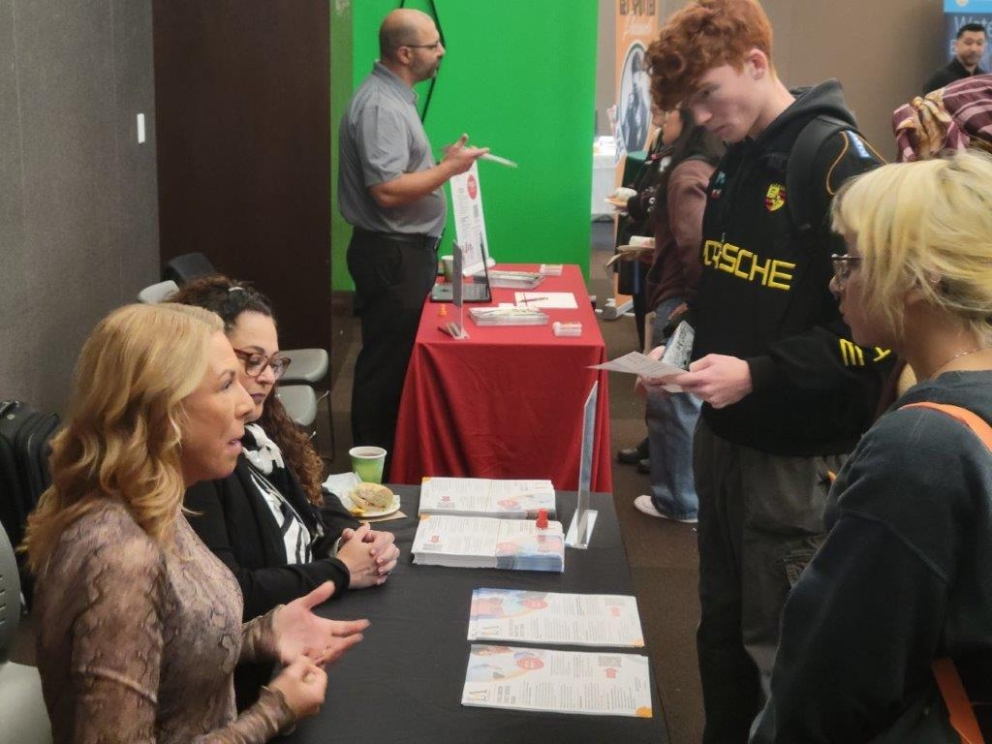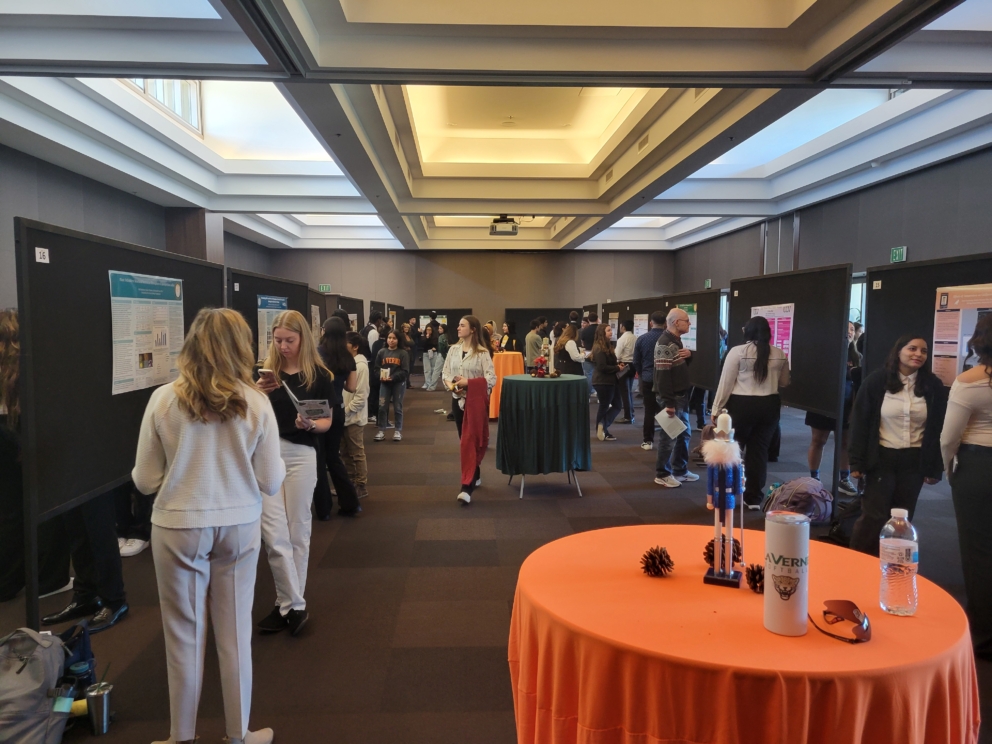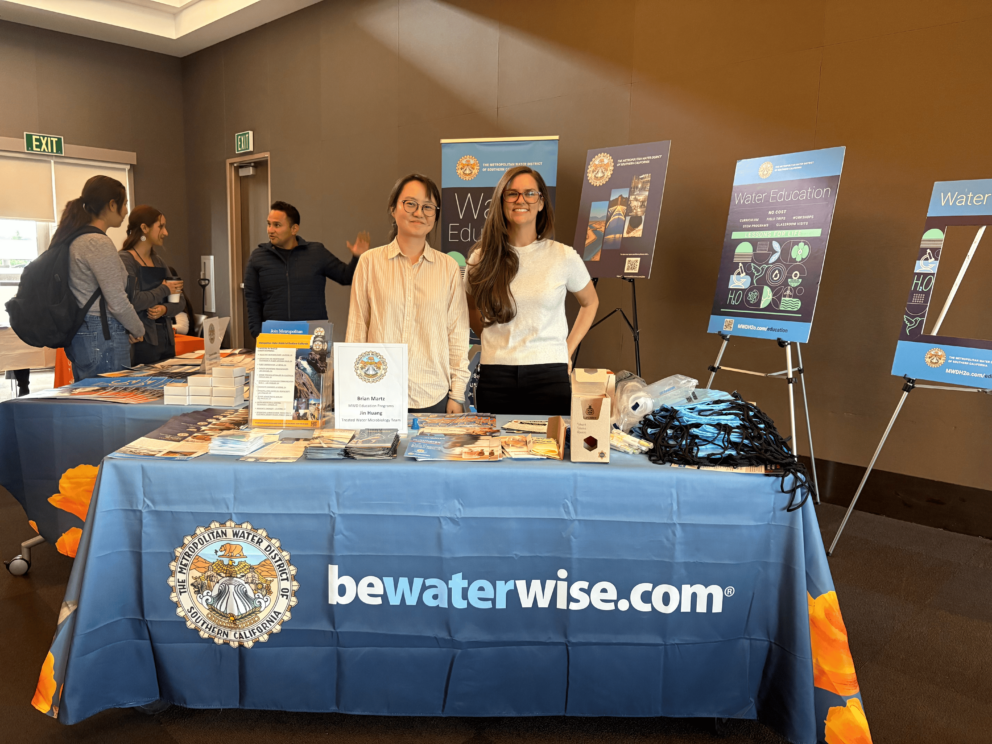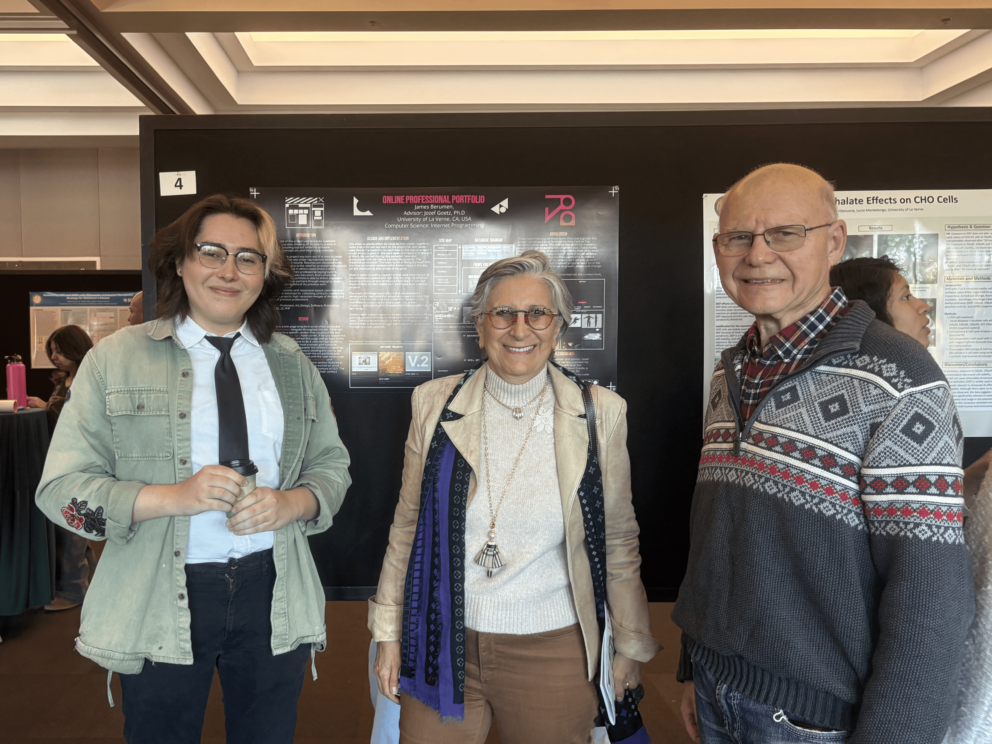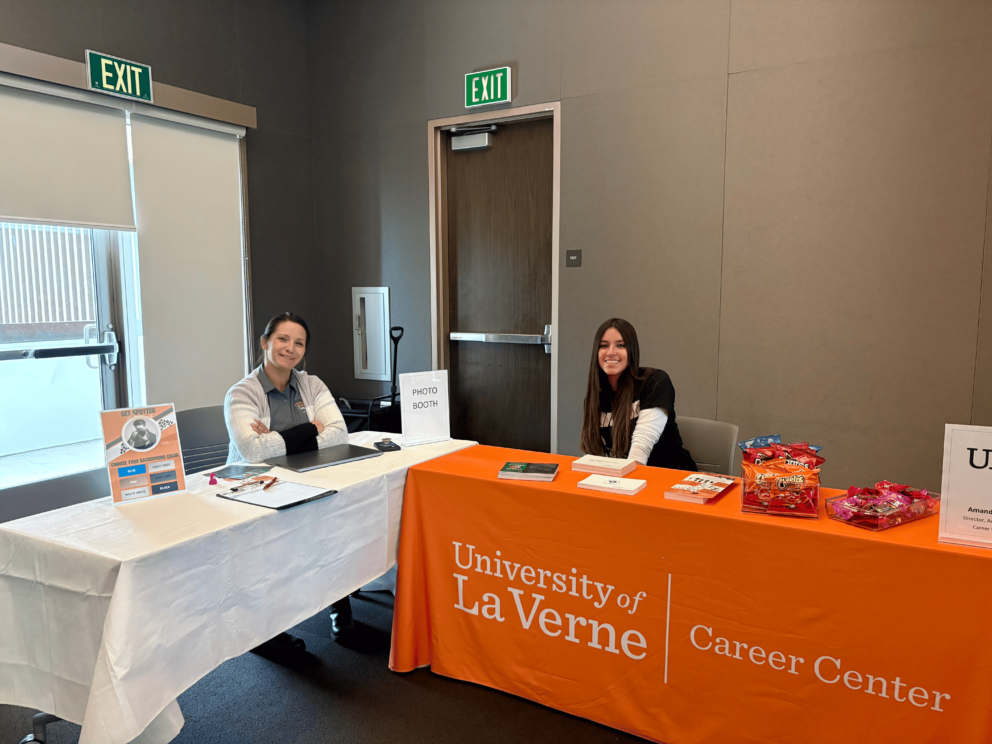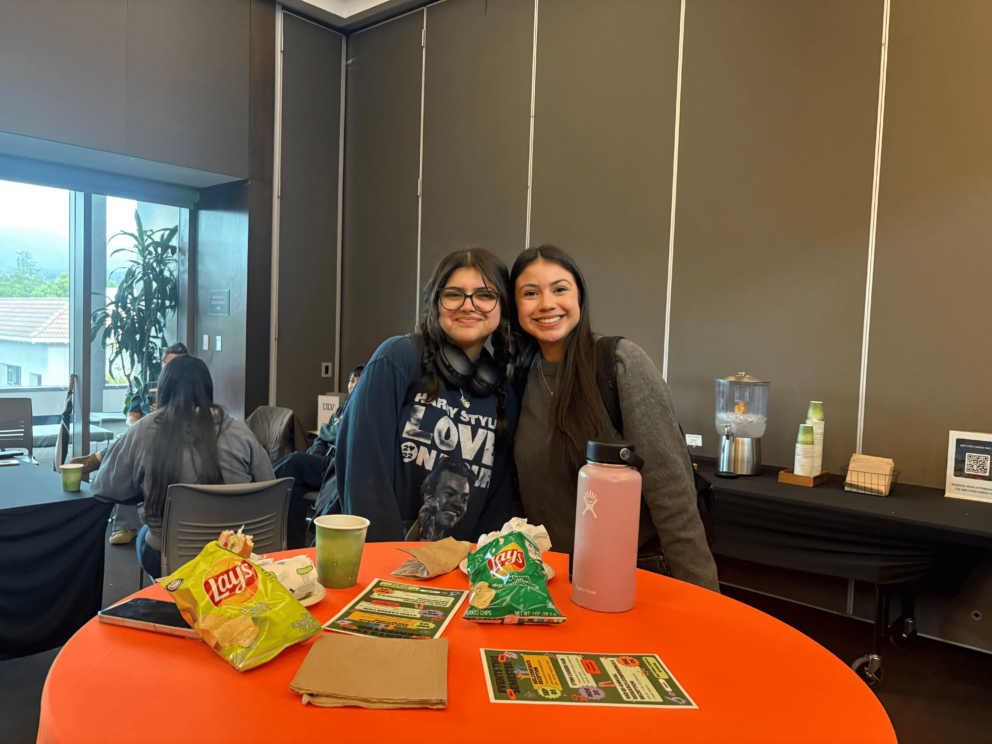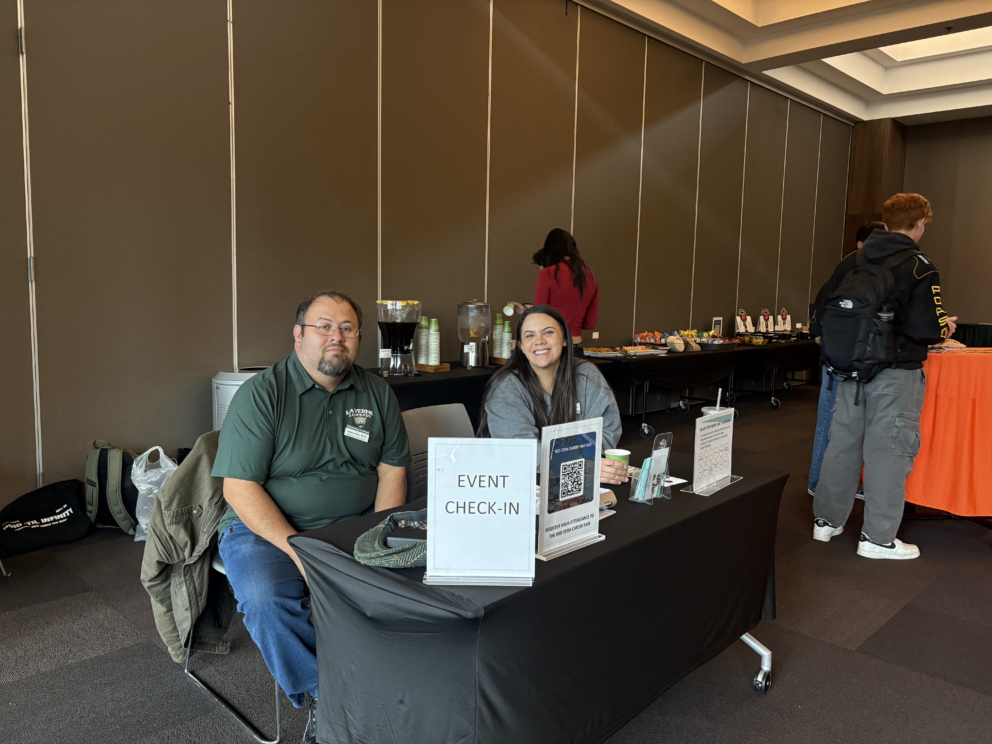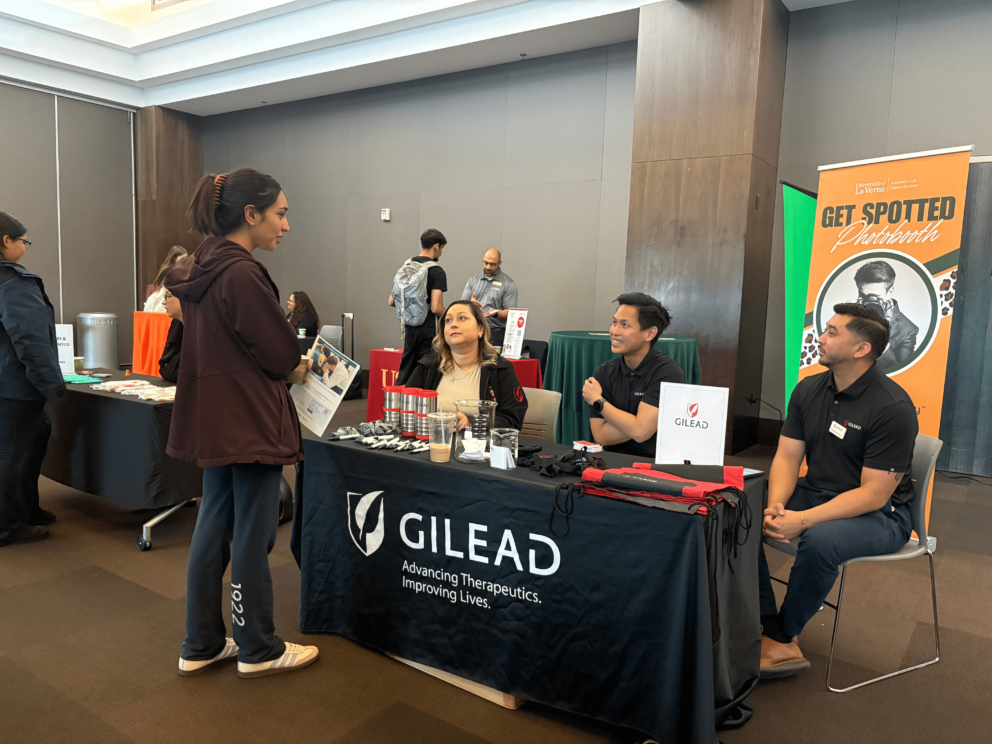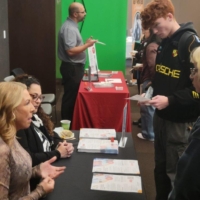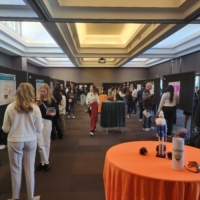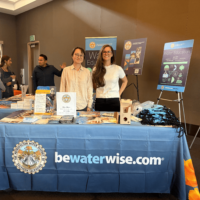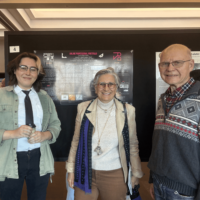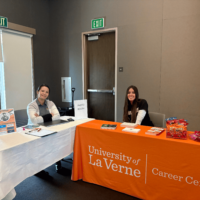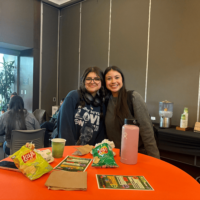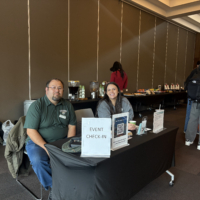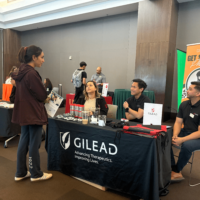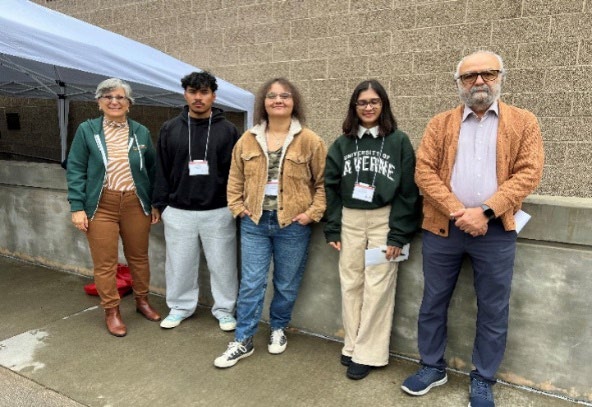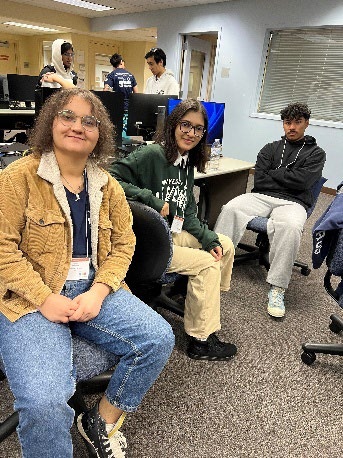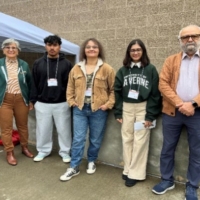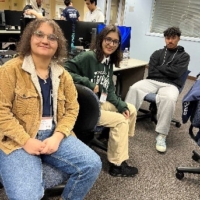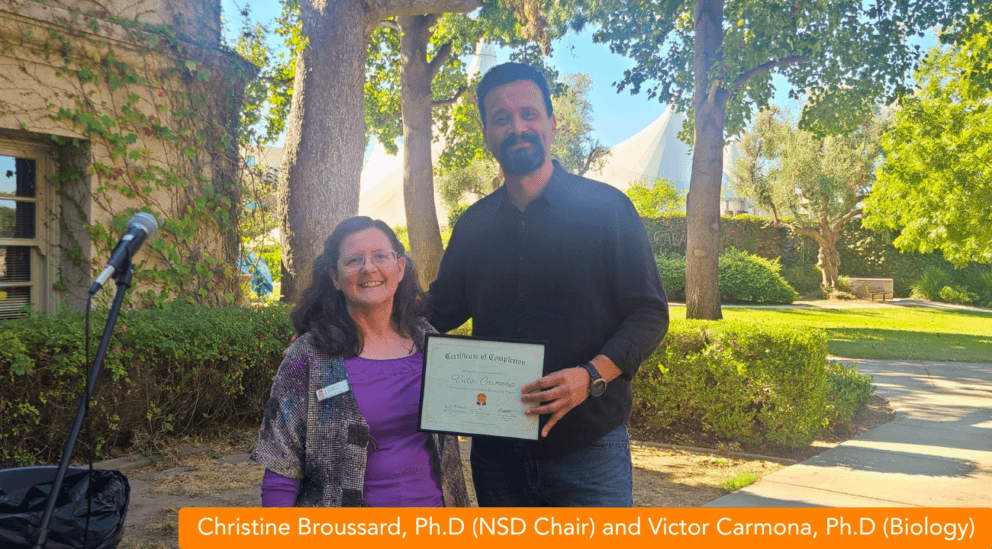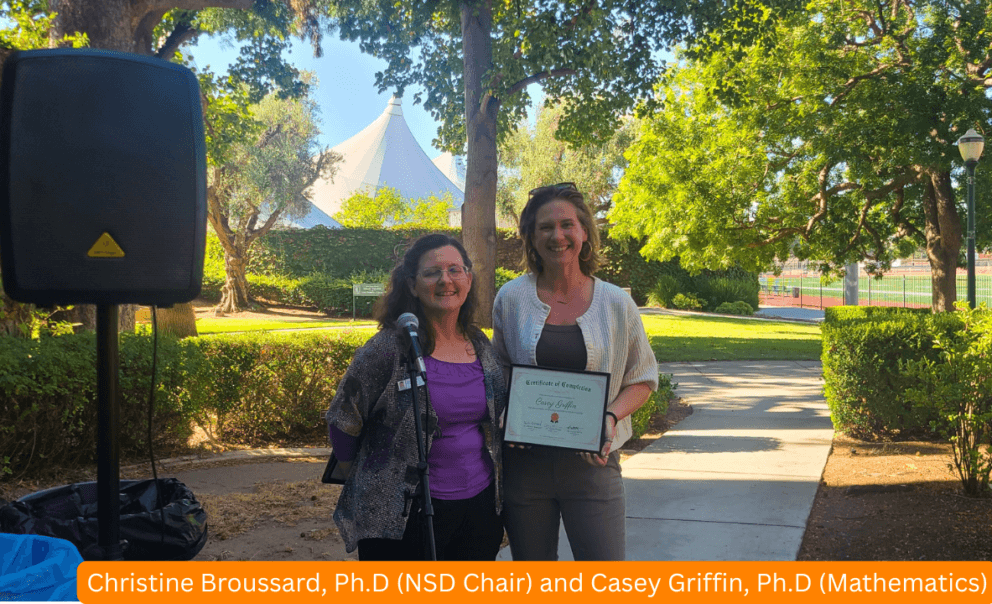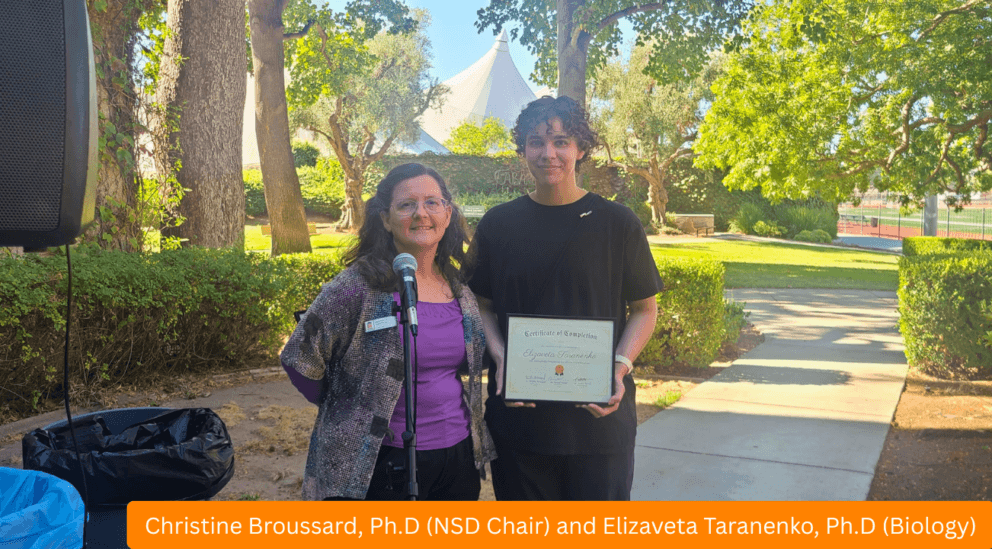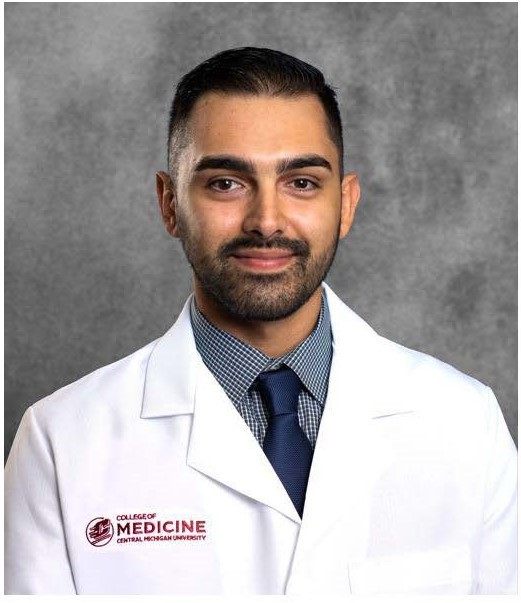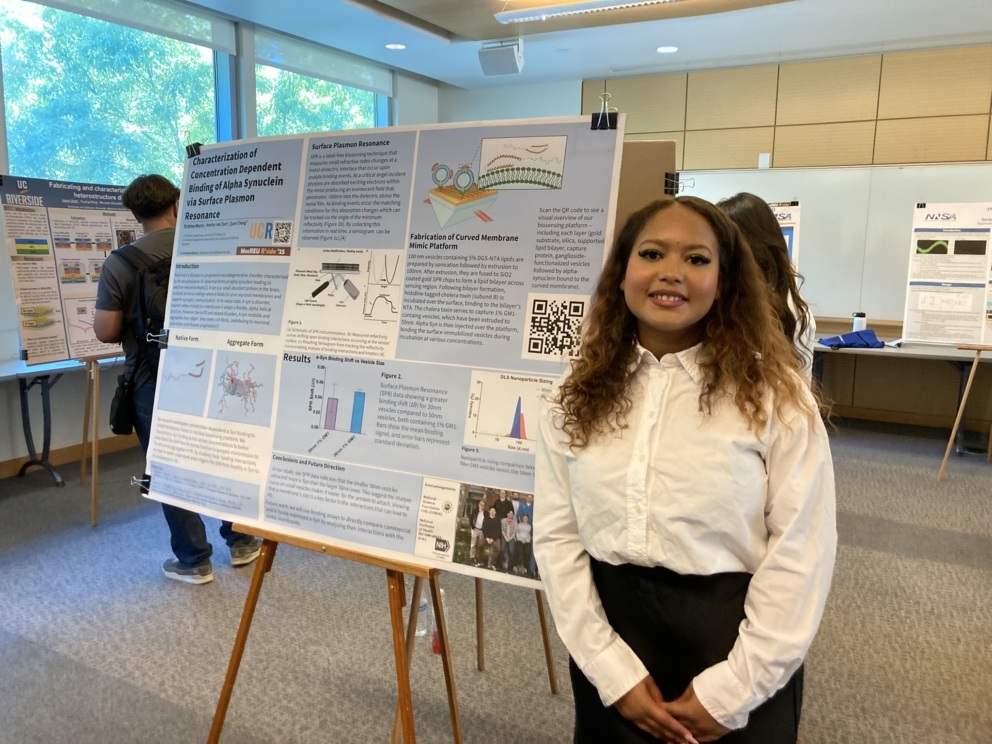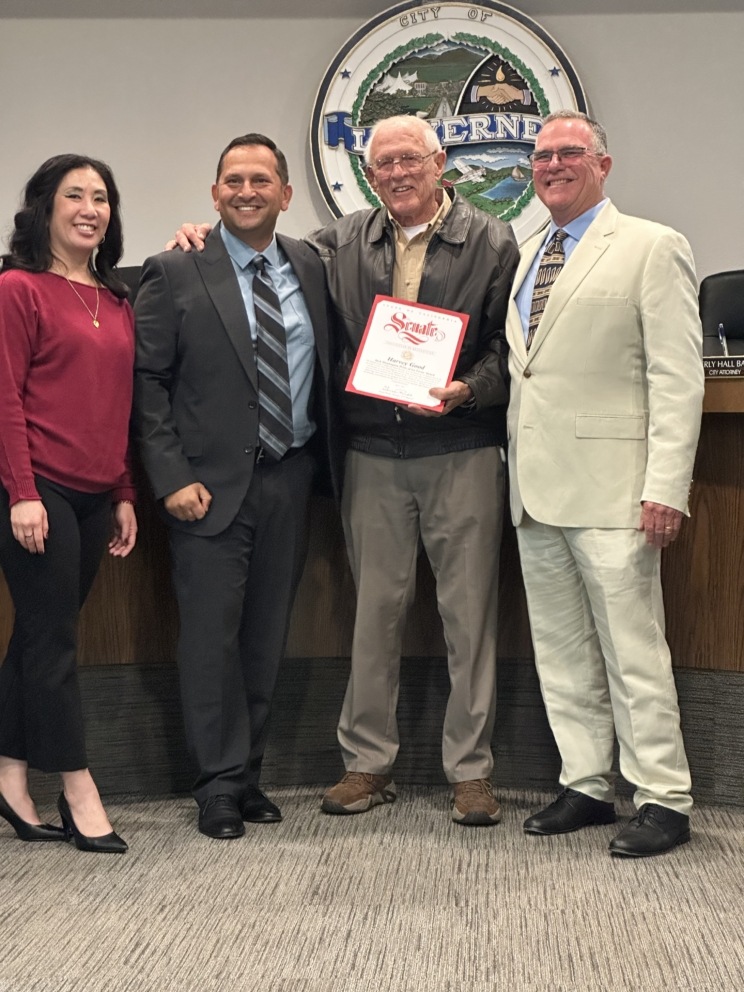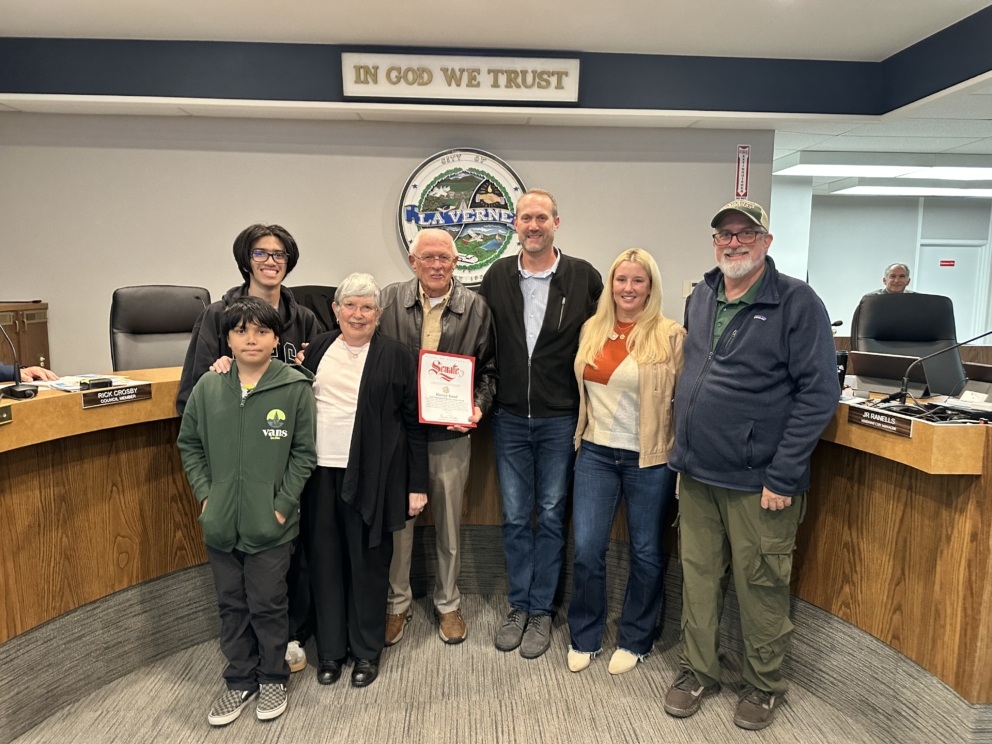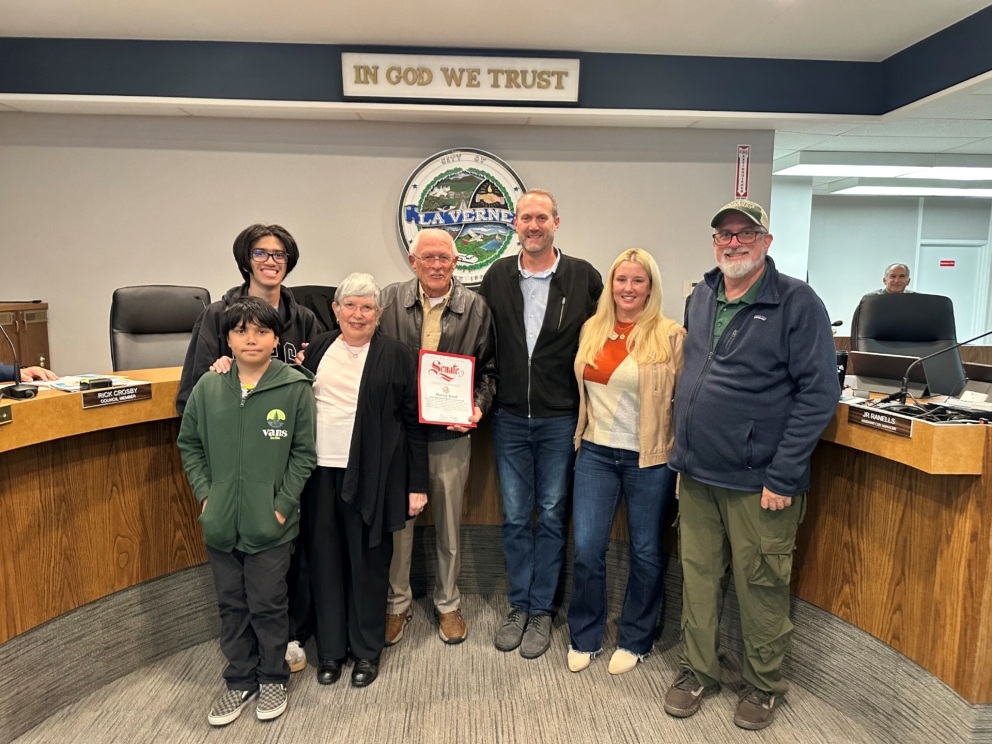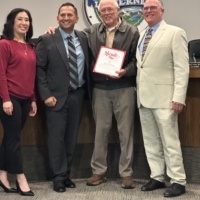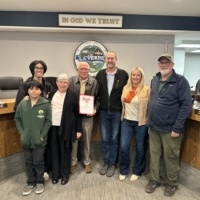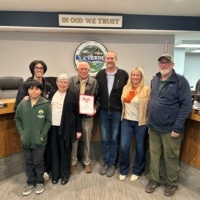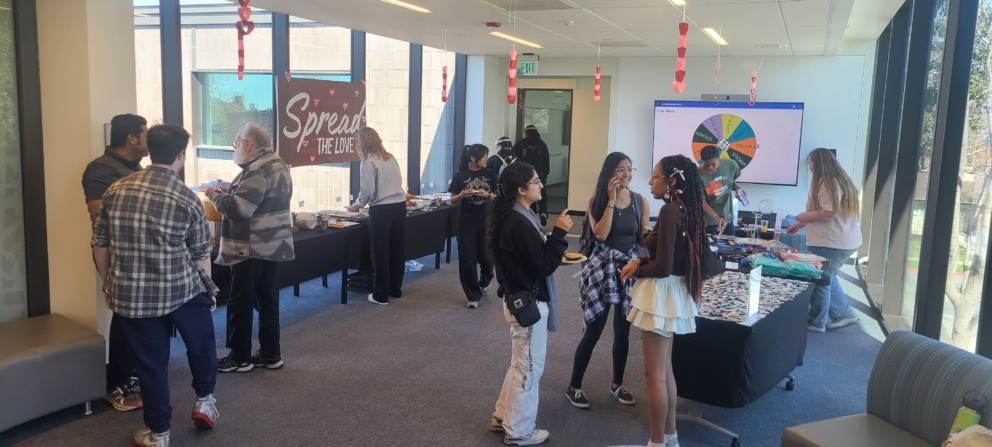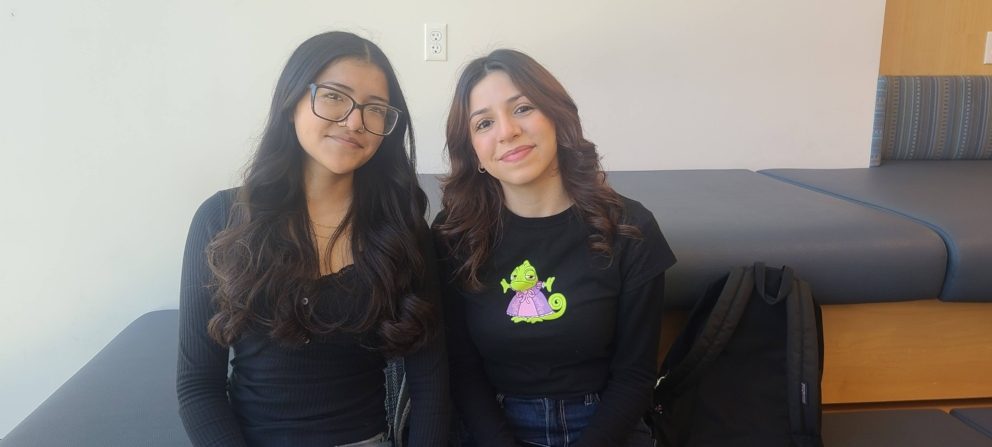College of Arts & Sciences Good News – Natural Science Division Edition
November – December 2025
Math Senior Projects
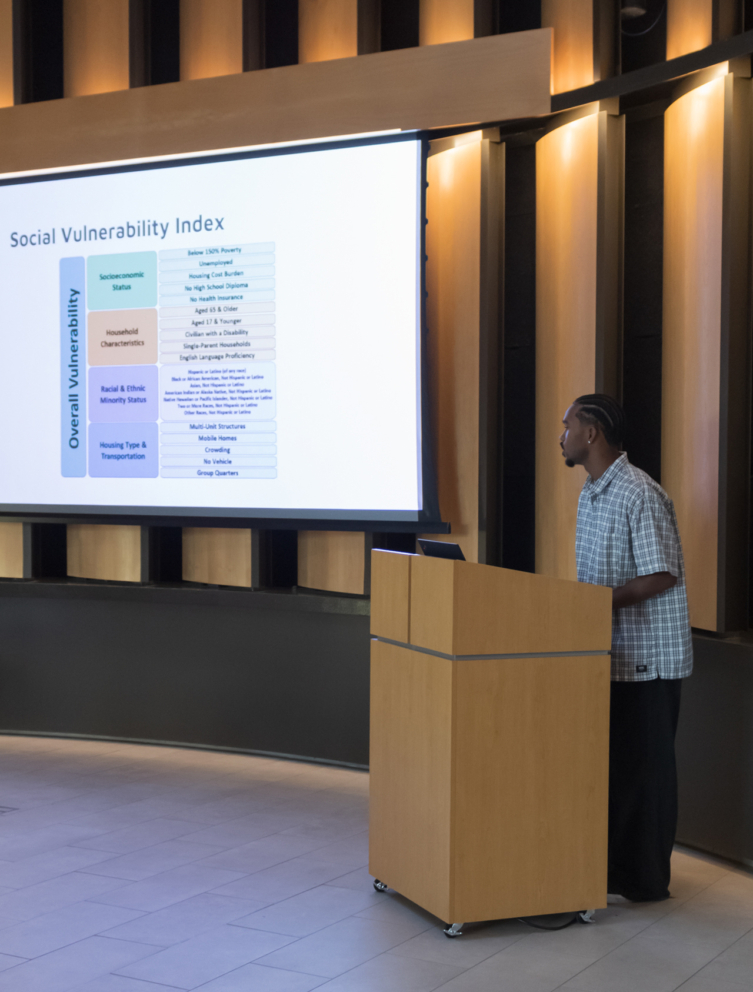
Senior Math major Kaelem Walker presents his senior project presentation Tuesday in the Ludwick Center Sacred Space. His project was an analysis of the statistics of Covid-19 cases in California.
photo by Joseph Nocero
NSD-BI-Annual Research Conference & Reception
Natural Science Division – hosted the NSD Bi-Annual Research Conference & Reception where poster from CURE courses or mentored research were welcomed.
NSD also hosted a STEM career Fair on November 20th. The event provided students with the opportunity to meet representatives from graduate programs as well as professionals in their fields. ULV Career Services also offered a photo booth, allowing students to update their LinkedIn profile photos.
Faculty News
Jay Jones (Professor Emeritus of Biology and Biochemistry) attended a lecture and workshop tour in China. Presentations and workshops were made at Pu’er University, Yunnan University, Anhui University, Shanxi Normal University, the Chinese equivalent of our EPA and other venues. The topics centered on various aspects of sustainability, education, and ethics. In addition, he gained direct cultural experience for use in teaching and other endeavors.
Vanessa Preisler (Physics) The Physics Program hosted the Southern American Association of Physics Teachers’ Fall meeting. Dr. Preisler gave a presentation on integrating Justice, Equity, Diversity, and Inclusion into Physics and STEM teaching. Laurence Stein presented Childhood Physics.
Student and Alumni News
Gargi Darade, Adel Ozdem, Reiniery Villatra (Computer Science & Computer Engineering) represented ULV at the 2025 International Collegiate Programming Competition (ICPC) hosted at the Riverside Community College. ULV was among 75 colleges and universities competing in the prestigious event, marking three years of participation.
September – October 2025
Faculty News
JEDI in STEM
Dr. Victor Carmona (Biology), Dr. Elizaveta Taranenko (Biology), Dr. Casey Griffin in the yearlong JEDI (Justice, Equity, Diversity, & Inclusion) in STEM Program, a professional learning program centered around cultural competence and equity-mindedness. The program helped faculty develop skills to meet their changing roles that increasingly require faculty to adopt a holistic approach to supporting student success, beyond the traditional focus on the cognitive domain of learning. Faculty participated in professional activities, reflecting on their teaching through reading and writing, discussion of Culturally Sustaining Practices (CSP), learning about inclusive pedagogies, and revising curriculum in faculty learning communities.
The Certification of Completion Awards were presented at the NSD Fall Welcome Back Reception on Friday, September 5, 2025.
Student News
Eddie Avellaneda, (Biology) 2020, was accepted into Central Michigan University College of Medicine and started this fall.
Aileen Niesta (Physics) and Rei Villalta (Physics) participated in Undergraduate Research programs last summer. Aileen studied at the Harvard-Smithsonian Center for Astrophysics and Rei studied at the Center for Space Science at the University of Alabama in Huntsville. Both projects were related to solar physics and space weather.
July – August 2025
Faculty News
New CAS Faculty:
Alireza Abdoli, Assistant Professor (Computer Science & Engineering), expert in data mining and machine learning.
Victoria Lumsargis-Roth, Assistant Professor of Chemistry, expert in physical chemistry and spectroscopic techniques in cultural heritage research
Faculty on Sabbatical –
Gail Tang – Mathematics
Jud Holiday – Rhetoric Communication Studies
Student News
December 2024-May 2025
Student News
Brandon Aun (Biology) has been accepted into the following Doctor of Dental Surgery programs:
- Arizona School of Dentistry & Oral Health
- Loma Linda University
- University of Southern California
- Western University of Health Sciences
Congratulations, Brandon!
Chrystal Olazabal(Biology) has been accepted into Western University of Health Sciences’ Masters of Science in Nursing – Entry Program.
Congratulations, Chrystal!
Gabriela Rojas(Biology) earned the Society of Toxicology’s Perry J. Gehring Diversity Student Research Travel Award and presented her work, “The Effects of Alcohol Consumption on Alzheimer’s Disease, A Systemic Approach”.
Congratulations, Gabriela!
Society of Toxicology’s Undergraduate Diversity Program Student Travel Award Recipients:
- Diana Castaneda (Biology)
- Gina Ehlenburg (Biology)
- Eman Fasih (Biology)
Congratulations Diana, Gina, & Eman!
Erika Garcia (Chemistry) has been admitted to USC’s School of Pharmacy – Doctor of Pharmacy program.
Congratulations, Erika!
Hannah Aranki(Chemistry) accepted admission into UCR chemistry Ph.D. Program.
Congratulations, Hannah!
Karime Leon-Niebla (Mathematics) was accepted into the Facilitated-Graduate Application Process (F-GAP) program through the Math Alliance. This program is designed to increase student representation from minoritized groups at the Mathgraduate school level.
To read more, see: https://mathalliance.org/fgap-information-for-students.html
Congratulations, Karime!
Cherie Atalor (Computer Science, Mathematics, and Physics) received a Sprirt of La Verne Award for Religious and Sprititual Life.
The Spirit of La Verne is sponsored by the Office of Civic and Community Engagement, the Office of Religious and Spiritual Life, the Office of Diversity, Equity and Inclusion, the Office of International Services and Study Abroad, and the Center for Multicultural Services.
Congratulations, Cherie!
Taylor Puno, Emily Heldenbrand, Ashley Ortiz, Jasmine Reola, Annette Aladefa, Crystal Zaragoza, Anette Shekanino, along with faculty member Victor Carmona, Ph.D. (Biology) published a paper entitled “Urban heat and cool island effects on aerosol microbiome assemblages” in BIOS a Quarterly Journal of Biology, March 2025, Vol 96, No. 1, 9-15. https://doi.org/10.1893/BIOS-D-23-00014
Discover the full article at the BioOne Digital Library, here.
Allison Arms (Biology) has received a post-graduate job offer from the Federal Bureau of Investigation (FBI) that derived from her attendance to the Fall STEM Career Fair.
Congratulations, Allison!
Casey Griffin (Mathematics) has been accepted into the STaR Program. The STaR (Service, Teaching, and Research) Program is a highly regarded early career induction program for faculty in mathematics education designed to support new faculty as they navigate the challenges of developing leadership and service skills, teaching mathematics content and methods courses for K-12 educators, and establishing a strong research agenda.
Congratulations, Casey!
Kendall Winn, Lauren Kostich, Mackenzie Castaneda-Childress, Isaiah Solis, Jade Remillard, Avaleen Agustin, and Demetri Gonzalez (Biology) and Victor Carmona, Ph.D. (Biology) are to be congratulated in their publication in Acto Microbiologico Hellenica, a microbiology journal.
Congratulations, All!
Haroon Ahmed (Computer Science & Computer Engineering) was accepted to UCI and ULV to pursue a Masters Degree.
Congratulations, Haroon!
Diego Gonzalez (Mathematics) has won FIRST PLACE for the Dean’s Award. This is the first time a math major has won first and only the second time Math major has won the award at all (Luke Garcia got honorable mention Spring 2023).
Diego was awarded for the work he conducted at his REU during the summer of 2023. He traveled to George Mason University to work under Dr. Padhu Seshaiyer. They presented their results to JMM 2024 and published a paper later that year. You can view the published paper here:https://scholarship.claremont.edu/codee/vol18/iss1/4/
This is monumental for both Diego and the Math Program. CONGRATULATIONS!!! We hope you can make it to the awards ceremony!
Congratulations, Diego!
Faculty News
Harvey Good (Biology Emeritus) received the Jack Huntington Pride of La Verne Award from the La Verne City Council on May 5, 2025. He was also honored with the LA County Fair Hero Award on May 9, 2025.
Dr. Hou U. Ung (Chemistry) published in the International Journal of Mass Spectrometry, Volume 509, March 2025, 117409, titled, Synthesis of bis(guanidinylated-methylcytosine) and its effect toward nucleobase binding.
Stephanie Pruett (Natural Science Division, CAS) has been awarded a Spirit of La Verne Award for Civic and Community Engagement.
The Spirit of La Verne is sponsored by the Office of Civic and Community Engagement, the Office of Religious and Spiritual Life, the Office of Diversity, Equity and Inclusion, the Office of International Services and Study Abroad, and the Center for Multicultural Services.
Congratulations, Stephanie!
Victor Carmona, Ph.D. (Biology) is excited to share a new publication, which grew out of a collaborative exploration that Dean Mathews, Christine Broussard, Ph.D., and Todd Lorenz, Ph.D. helped foster:
- Carmona-Galindo, V.D.; Velado-Cano, M.A.; Groat-Carmona, A.M. The Ecology of Climate Change: Leveraging Virtual Reality to Share, Experience, and Cultivate Local and Global Perspectives. Educ. Sci. 2025, 15, 290. https://doi.org/10.3390/educsci15030290
On a personal note, Dr. Carmona would like to share that this is his first publication with his younger sister, Assistant Professor Anna Groat Carmona at the University of Washington-Tacoma.
I want to express my sincere gratitude for the incredible environment you’ve [NSD] created – one where collaboration, creativity, and pushing the boundaries of education are truly valued. I have never felt more at home in an institution, and I recognize how rare and meaningful that is. Your [Dean Mathews, Dr. Broussard, and Dr. Lorenz] leadership in fostering a space for innovation is what makes successes like this possible, and I see you.
Abstract
The global challenge of climate change demands innovative, inclusive, and experiential education that fosters ecological literacy, behavioral change, and climate advocacy. This study explores a cross-cultural collaboration between two undergraduate ecology courses—one at the University of La Verne (ULV) in California and the other at the Universidad Centroamericana José Simeón Cañas (UCA) in El Salvador—that employed 360° virtual reality (VR) photosphere photographs to investigate climate change impacts. Students documented local ecological phenomena, such as drought and habitat loss, and shared insights with international peers, facilitating a rich exchange of perspectives across biomes. Generative AI tools like ChatGPT were utilized to overcome language barriers, enabling equitable participation and enhancing cross-cultural communication. The findings highlight VR’s transformative role in helping students visualize and communicate complex ecological concepts while fostering empathy, emotional engagement, and agency as climate advocates. Institutional and curricular factors shaping the integration of VR-based approaches are discussed, along with their potential to drive behavioral shifts and promote global engagement. This study demonstrates that immersive technologies, combined with collaborative learning, provide a powerful framework for bridging geographic and cultural divides, equipping students with the tools and perspectives needed to address the critical global challenges posed by climate change.
JEDI in STEM
Dr. Ariela Kaspi Kaneti(Chemistry) and Dr. Jennifer Clarke (Biology) in the yearlong JEDI (Justice, Equity, Diversity, & Inclusion) in STEM Program, a professional learning program centered around cultural competence and equity-mindedness. The program helped faculty develop skills to meet their changing roles that increasingly require faculty to adopt a holistic approach to supporting student success, beyond the traditional focus on the cognitive domain of learning. Faculty participated in professional activities, reflecting on their teaching through reading and writing, discussion of Culturally Sustaining Practices (CSP), learning about inclusive pedagogies, and revising curriculum in faculty learning communities.
The Certification of Completion Awards were presented at the NSD Spring Welcome Back Reception on Friday, February 21, 2025.
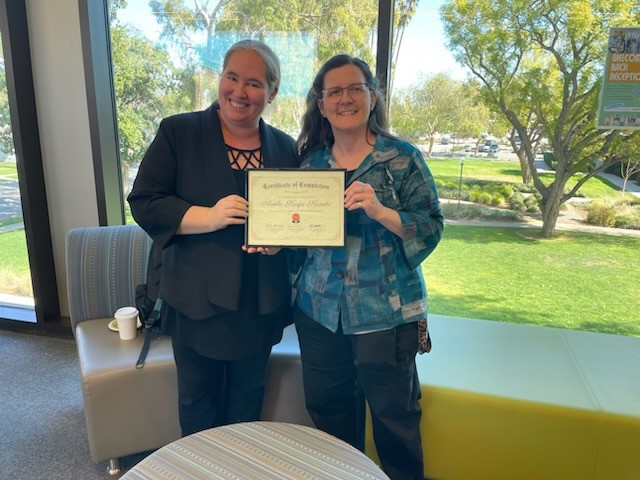
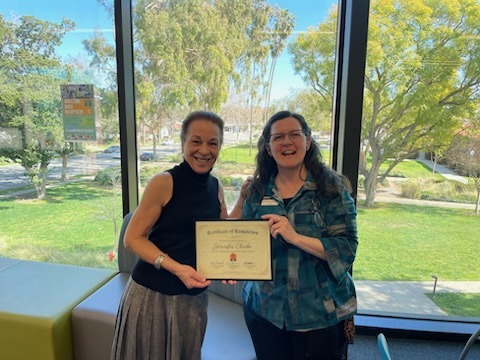
Department News
The Natural Sciences Division hosted the NSD Bi-Annual Research Conference & Reception in December. This was a JEDI in STEM Project.
NSD also hosted a Spring Semester Welcome Back Reception on February 21, 2025. The community event gave students, staff, and faculty a chance to come together and enjoy good food, games, and prizes.
David Chappell (Physics) PHYS 365 course viewed the Milky Way in daylight with their student constructed radio telescope.
Mathematics
The Math Club, Black Student Services, Women in Physics, and the Black Student Union hosted a screening of Journey of Black Mathematicians: Forging Resilience on February 24, 2025.
CAS Dean Office hosted the Frederick Douglas Human Rights Lecture feature guest speaker Jason
De Leon. Dr. De Leon’s research includes studies of the migration from Latin America to the U.S. of
clandestine migrants crossing the U.S.-Mexico border.
